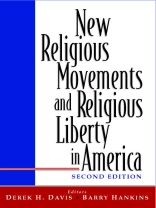New nontraditional religious movements are the most likely groups to offend mainstream culture and the least likely to have representatives in government to ensure that their liberty is protected. These new religious movements are sometimes ostracized and subject to various forms of discrimination. As America becomes increasingly pluralistic, with more and more groups contributing to the nation’s religious mosaic, new religious movements may well play an increasing role in the course of religious liberty in America, just as groups such as the Jehovah’s Witnesses did formerly. This book explores the problems and possibilities posed by new religious movements for religious liberty in America.
Зміст
Acknowledgement
Preface
Introduction
Barry Hankins
1. Controversial Christian Movements: History, Growth, and Outlook
Timothy Miller
2. The Cult Awareness Network and the Anticult Movement: Implications for NRMs in America
Anson Shupe, Susan E. Darnell, and Kendrick Moxon
3. A Contemporary Ordered Religious Community: The Sea Organization
J. Gordon Melton
4. Women in Controversial New Religions: Slaves, Priestesses, or Pioneers?
Susan J. Palmer
5. Satanism and Witchcraft: Social Construction of a Melded but Mistaken Identity
James T. Richardson
6. A Critical Analysis of Evidentiary and Procedural Rulings in Branch Davidian Civil Case
Stuart A. Wright
7. New Religious Movements and Conflicts with Law Enforcement
Catherine Wessinger
8. Christian Reconstruction after Y2K: Gary North, the New Millennium, and Religious Freedom
Adam C. English
9. A Not So Charitable Choice: New Religious Movements and President Bush’s Plan for Faith-Based Social Services
Derek H. Davis
10. Fighting for Free Exercise from the Trenches: A Case Study of Religious Freedom Issues Faced by Wiccans Practicing in the United States
Catharine Cookson
11. The Persecution of West Virginia Jehovah’s Witnesses and the Expansion of Legal Protection for Religious Liberty
Chuck Smith
Notes
About the Contributors
Index
Про автора
Derek H. Davis is director of the J.M. Dawson Institute on Church-State Studies at Baylor University. Editor of the Journal of Church and State, his publications include Original Intent: Chief Justice Rehnquist and the Course of American Church-State Relations (1991) and Religion and the Continental Congress, 1774-1789: Contributions to Original Intent (2000). He has also published extensively in various law and academic journals. Barry Hankins is Associate Professor of History and Church-State Studies at Baylor University. He is author of God’s Rascal: J. Frank Norris and the Beginnings of Southern Fundamentalism (1996) and Uneasy in Babylon: Southern Baptist Conservatives and American Culture (2002). He is also co-editor with Derek Davis of Welfare Reform and Faith-Based Organizations (1999).







![Обкладинка Brian Schrag & Julisa Rowe: Community Arts for God's Purposes [Chinese] 貼近神心意的社群藝術 Обкладинка Brian Schrag & Julisa Rowe: Community Arts for God's Purposes [Chinese] 貼近神心意的社群藝術](https://static.worldofdigitals.com/thumb_webp/740/9781645083740.webp)




